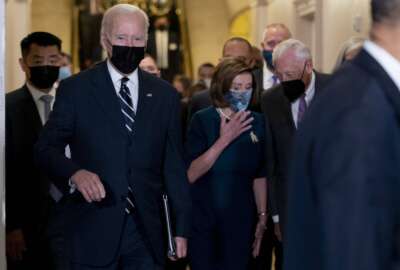
House leadership wants to get on with a final appropriation agreement for fiscal 2022
For more, Bloomberg Government Deputy News Director Loren Duggan spoke to Federal Drive with Tom Temin.
Best listening experience is on Chrome, Firefox or Safari. Subscribe to Federal Drive’s daily audio interviews on Apple Podcasts or PodcastOne.
House Majority Leader Steny Hoyer is impatient. He wants the House to work out differences with the Senate on the fiscal 2022 regular spending so the government can get past the continuing resolution. For more, Bloomberg Government Deputy News Director Loren Duggan spoke to Federal Drive with Tom Temin.
Interview transcript:
Tom Temin: And this is about one solid thing you can sink your teeth into these days given everything else going on but what is the status and what did Steny Hoyer specifically call for?
Loren Duggan: He would like the House and Senate appropriators to get moving on the appropriations bills, basically. What we’ve seen is proposals come out of both committees. The House appropriators approved all 12 bills and passed nine of them. The Senate appropriators formally marked up three and then released the nine others. So we have a lot of text here on the regular spending bills, but there’s still no consensus on how much to spend in total. And then in each of these 12 bills, kind of getting to the nitty gritty, how much do you give different agencies? And what writers do you contain? So he wants them to get to the table. Now, Rosa DeLauro, who’s the chairwoman in the House has said she doesn’t know that they could meet that sort of deadline, but that she and her subcommittee chairs will keep chipping away at this. Republicans on their part have told us that they aren’t sure that they can wrap all this up by Dec. 3, which is when the stopgap funding bill runs out, the current continuing resolution. So maybe we’ll be looking at another one of those in December. But Dec. 3 is shaping up to be a pretty busy day and Congress or at least a pretty big deadline that will force action on a lot of things, including this government funding stuff. So a lot to happen there. And those are just the routine spending bills, not to mention these other massive packages that may be moving in the coming weeks.
Tom Temin: Right. And on the regular appropriations. The differences are – they do have real differences, don’t they?
Loren Duggan: They do have real differences. And I would say that there’s not an agreement on the Defense side of the ledger. But there’s a consensus that’s emerged through the separate Defense authorization process where all sides seem to be comfortable with $25 billion more than requested. So really, the discrepancy is going to be more on the non-defense side, and how do you reconcile that? It’s important to remember that Republicans have leverage here in the Senate because it will take 60 votes to cut off the bait on any package and let that move forward. So really, Richard Shelby, who’s the ranking member on the Senate Appropriations Committee, a senator from Alabama, he’s going to have a lot to say and how the overall number looks and what these individual bills look like. And one thing to also remember is earmarks are back this time around, our Jack Fitzpatrick wrote a story last week looking at the earmarks that are in here. And Richard Shelby is actually one of the big recipients of earmarks in that. So you could see that helping them get to an agreement on that old thing of having skin in the game really does help sometimes. So we’ll see a lot of discussion on top lines, or maybe we won’t see it, but we’ll hear about it happening in backrooms. But that’s going to be a big thing happening behind the scenes as they try to figure out a path forward.
Tom Temin: Yeah, so those crunchy bags of pork skins have now transmogrified into nice, fat pork that’s fleshy that they can pass around in Congress.
Loren Duggan: Indeed.
Tom Temin: If you like that analogy, if you eat pork rinds. Alright, and there’s, again on the small change front, if you will – everything’s relative – the highway funding extension package.
Loren Duggan: Well, there was an extension that the House and Senate cleared for President Biden last week to keep these programs that are funded through the Highway Trust Fund open. There was a brief lapse of that earlier in October, because this happened separate from the spending package. This is an authorization. The infrastructure bill that has been stalled for a couple of months now, would reauthorize those programs for five years. This extension takes those programs to Dec. 3, which gives them more time to figure out what they’re doing on the infrastructure and reconciliation packages, but keeps those agencies that need that authorization place open. So unlike in October, when there was 3,700 employees who were furloughed, this should keep things running, allow money to flow to the states and keep those going. Now, it’s worth noting transportation stakeholders don’t like short term extensions anymore than federal agencies like CRs, but they would really like to see some action on the long term fix here, which we may see in the month of November.
Tom Temin: I guess from the industry standpoint, they don’t want to start a bridge or a road only to have funding run out in a couple of months or something like that.
Loren Duggan: Right. And the whole way these projects work are years out in advance, which is one reason you have these five year packages. So that state [departments of transportation] know how much they’re going to have into the future so they can plan for those major projects.
Tom Temin: And the bill this was tied to was the trillion-dollar bipartisan infrastructure bill, not the big social infrastructure bill.
Loren Duggan: That’s correct. That’s the infrastructure bill that the Senate passed in August is sitting in the House. They were going to vote on that in September. That was pulled and there was some talk about doing that last week. We’ll see if they’re going to be ready to vote on that in tandem with the the larger social spending climate change tax package that’s also still being written and finalized.
Tom Temin: We’re speaking with Lauren Dugan. He is the deputy news director at Bloomberg Government. And yeah, so that package everyone thought would happen by Friday and then – no. And there’s already statements coming from different trade groups on the failure of the votes to tie those two packages together and get over the line. So is that going to still dominate this week?
Loren Duggan: I think this bill until it’s potentially passed and signed into law will dominate most of the discussion just because there’s so much in it. There’s so much at stake here, both politically and policy-wise for the Biden administration and for Democrats in Congress. This has a lot of their priorities that they wanted to push through, they’ve had to give some up along the way, obviously, things like paid leave that were in the package, then out of the package. There still could be more stuff coming into the package as it develops as the legislative happens. But what the president rolled out before he flew to Europe was a $1.75 trillion spending package offset by about $2 trillion in different tax changes, and some mandatory spending changes. So the details there will continue to be poured over by people on Capitol Hill and off of it, because this has, stakes for a number of industries, and not just money that would flow to families, but changes in how businesses operate. So there, there’s a lot in this bill. So it’s obviously going to take out a lot of the oxygen on Capitol Hill.
Tom Temin: And so far as we know, the president was not able to obtain a papal bull, say telling Congress to go ahead and get this package done.
Loren Duggan: I don’t believe so. He may have had a private audience, but I don’t think that will redound on anything on the Hill.
Tom Temin: Alright. And getting back to more mundane matters there – lots of nominations in the second tier, below cabinet-level that are kind of washing through the Senate now.
Loren Duggan: That’s right. The committees have been very busy on these the last few weeks, turning them out holding the hearings, and then the markups to advance them to the floor. We have I think as many as seven different nominations teed up for this week, including a couple tonight, and then throughout the rest of the week for the Treasury Department, USAID and the top policy official at the Labor Department. So some of these came out on a bipartisan basis, and they may get bipartisan support on the floor. It’s important to remember that unlike needing 60 votes for legislation, you only need 50 votes to cut off debate in the Senate as long as the vice president’s available to break any ties. So these are likely to keep pushing through. So it’s something to put on the floor when you’re waiting for the next big thing as Chuck Schumer is. But it also, they need to churn through these to continue filling out the government and the judicial benches as well, because that’s also a big part of this.
Tom Temin: Well, we’re looking for the Merit Systems Protection Board nominees that have cleared committee, but that still needs to be voted on – of arcane interest or parochial interest to federal employees, but it’s really a big deal. And then there’s two new nominations to the Federal Communications Commission, one of whom is already there – Jessica Rosenworcel. So that – those are fresh nominations, so those will be probably a few weeks off.
Loren Duggan: A few weeks off, I mean, it takes time to turn through these and then they’re also working behind the scenes again, on packages of these. So there are – these big floor votes that happen. But then there are other ones that happen by voice vote, including nominations last week for a couple of former senators and widows of former senators who went through on voice vote so there wasn’t that big debate in the cloture vote in the confirmation. So these happen in different ways. And as the end of the year gets closer, you may see more wheeling and dealing to get these packages through even without votes.
Tom Temin: All right, anything else we need to know about the Hill this week?
Loren Duggan: I just think it’s gonna be a bumpy ride as they figure out this bill, but there will be some votes in committee and on the floor, but lots to watch for sure.
Tom Temin: And you can go watch the foliage I guess if you get tired of it all. It’s finally arriving in our region. Loren Duggan is deputy news director at Bloomberg Government. As always, thanks so much.
Loren Duggan: Thank you.
Copyright © 2025 Federal News Network. All rights reserved. This website is not intended for users located within the European Economic Area.
Tom Temin is host of the Federal Drive and has been providing insight on federal technology and management issues for more than 30 years.
Follow @tteminWFED




